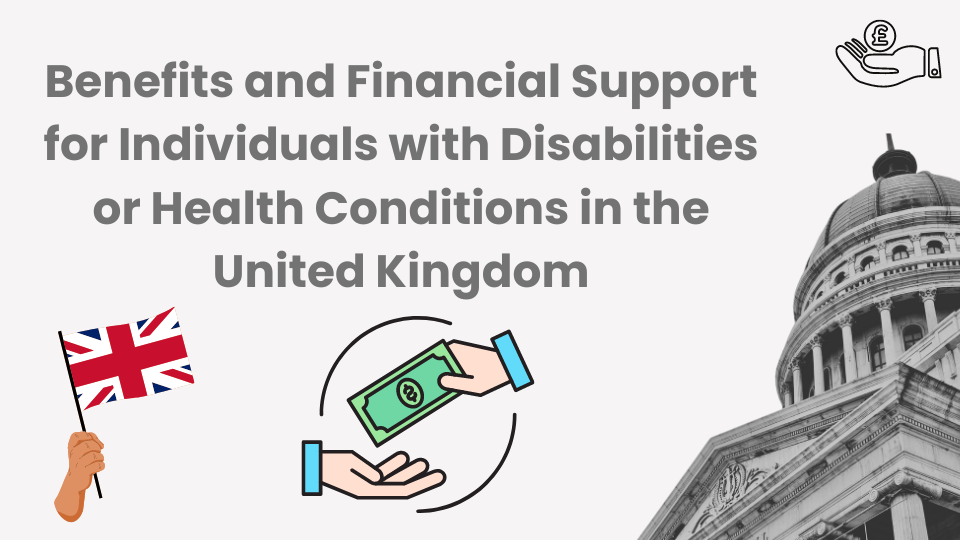Living with a disability or health condition can present many challenges, particularly financial. In the UK, the government offers various benefits and financial support programs to help those affected cope with their condition and maintain a decent standard of living. This article provides an overview of the main benefits and financial assistance available to people with disabilities or health conditions in the UK.
Key benefits and financial support
1. Personal Independence Payment (PIP)
The Personal Independence Payment (PIP) is designed to help people with the additional costs associated with long-term health conditions or disabilities. It is available to people aged 16 to 64.
Eligibility
- You must have a long-term health condition or disability.
- You must have difficulties with daily living or mobility.
- These difficulties must have existed for at least three months and be expected to last for at least nine months.
Benefit rates
The PIP consists of two components: daily living and mobility. There are two rates for each component: the standard rate and the enhanced rate. The amount you receive depends on how your condition affects you.
2. Employment and Support Allowance (ESA)
Employment and Support Allowance (ESA) provides financial support if you are unable to work due to illness or disability, and provides individual help for those who are able to work.
Eligibility
- Must be under the state pension age.
- You must have a disability or health condition that affects your ability to work.
Types of ESA
- Contributions-based ESA: Based on National Insurance contributions.
- Income-based ESA: means tested for those with low income or savings.
3. Universal credit
Universal Credit is a monthly payment to cover living costs for people on a low income or out of work. It can be applied for by people with disabilities or health conditions.
Eligibility
- Must be on a low income or unemployed.
- Can be claimed alongside other benefits such as PIP or ESA.
4. Disability Living Allowance (DLA) for children
Disability Living Allowance (DLA) for children is a benefit for children under the age of 16 who have difficulty walking or need more care than a child of the same age without a disability.
Eligibility
- Must be under the age of 16.
- Must have mobility or care needs due to a disability or health condition.
5. Attendance Allowance
Attendance Allowance is for people of state pension age or over who need help with personal care due to a physical or mental disability.
Eligibility
You must be over state retirement age.
Must need help with personal care or supervision due to a disability or medical condition.
6. Carer’s allowance
Carer’s Allowance is a benefit for people who spend at least 35 hours a week caring for a disabled person.
Eligibility
- You must care for one person for at least 35 hours per week.
- The person you care for must receive certain benefits, e.g. PIP or DLA.
- Additional support and resources
Blue badge scheme
The Blue Badge Scheme allows people with severe mobility impairments to park closer to their destination. It offers parking concessions and is available for both drivers and passengers.
Access to Work
Access to Work is a grant that helps people with disabilities or health conditions to get or keep a job. It covers additional costs incurred as a result of a disability, e.g. for special equipment, support workers or travel costs.
Grants for disabled facilities
Disabled facilities grants are awarded by local authorities to cover the cost of adapting homes, e.g. installing ramps, stair lifts or disabled bathrooms to improve accessibility for people with disabilities.
NHS Continuing Healthcare
NHS Continuing Healthcare is a care package for people with significant ongoing care needs. It is fully funded by the NHS and can be provided in a variety of settings, such as at home or in a care home.
Applying for benefits and support
Step-by-step guide
- Identify the benefits you are eligible for: Determine which benefits you are eligible for based on your condition and circumstances.
- Gather required documentation: Gather medical records, proof of identity and any other required documents.
- Complete applications: Complete the appropriate application forms for each benefit. This can usually be done online, by phone or by post.
- Submit applications: Submit your completed applications along with all required documentation.
- Attend assessments: You may need to attend assessments or interviews to check your eligibility.
- Receive a decision: You will receive a decision on your application. If approved, you will be informed of the amount and frequency of your payments.
Appeal procedure
If your application is rejected or you do not agree with the decision, you can lodge an appeal. The procedure includes the following steps:
Mandatory reconsideration: Request a reconsideration of the decision by a different decision maker.
Appeal to a tribunal: If the reconsideration is unsuccessful, you can appeal to an independent tribunal.
Navigating the benefits system can be complicated, but knowing the options and procedures available can help you secure the financial support you need. Whether you are an older person, an adult with a disability or a parent of a child with a health condition, the UK government offers various benefits to help manage the additional costs and challenges associated with disabilities and health conditions. Detailed information and assistance can be obtained from the relevant government departments, local authorities or disability support organizations.



